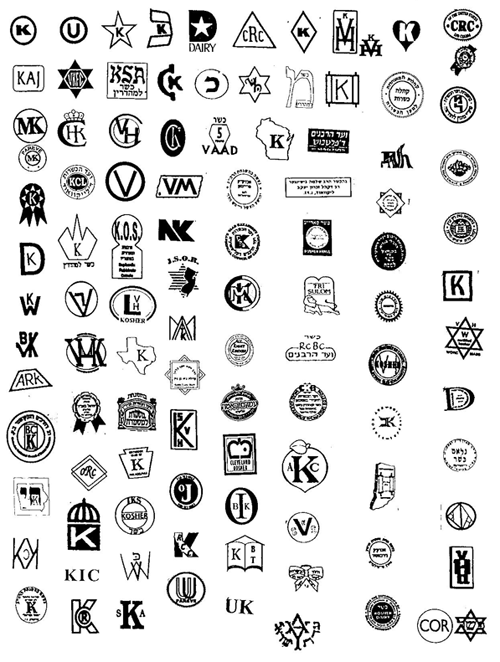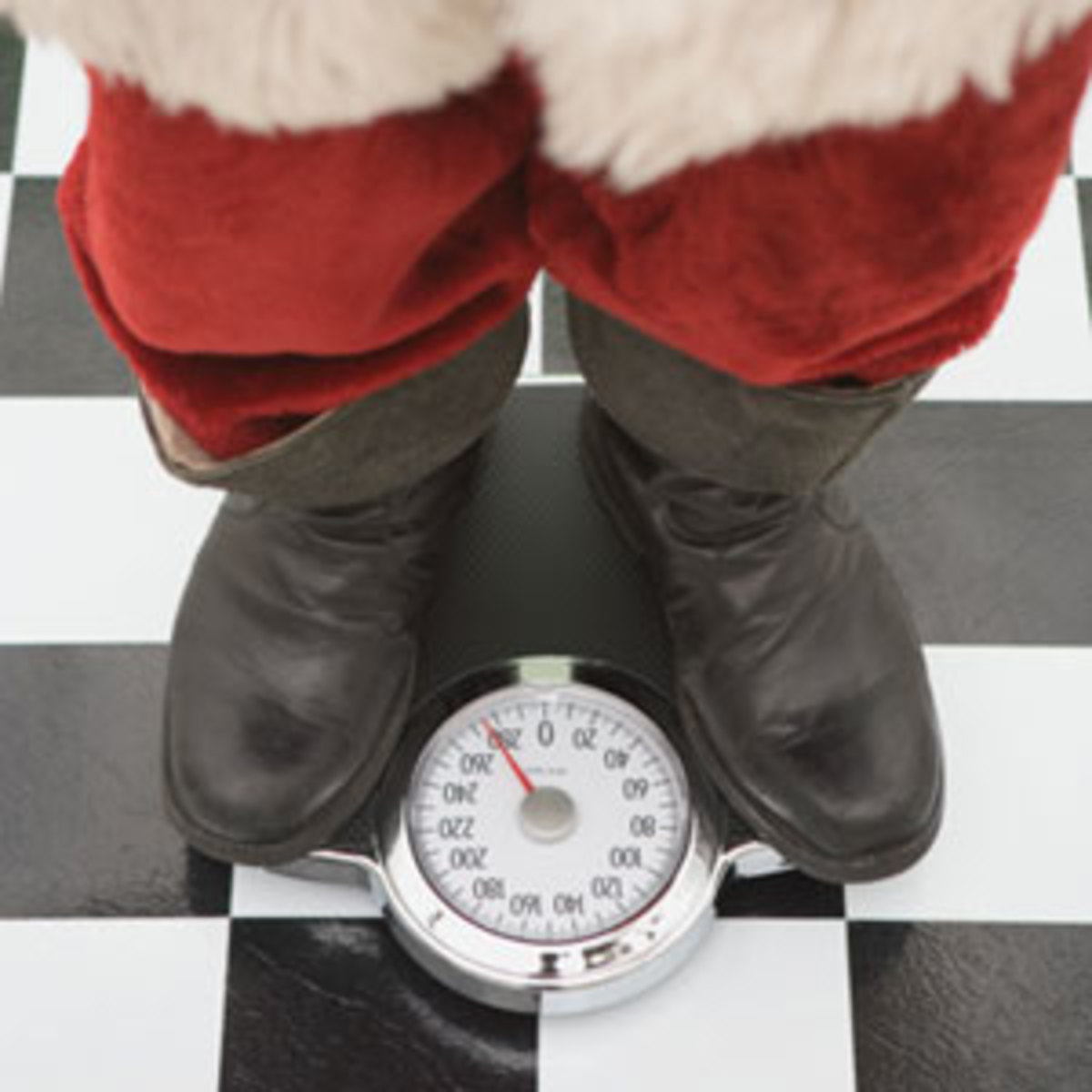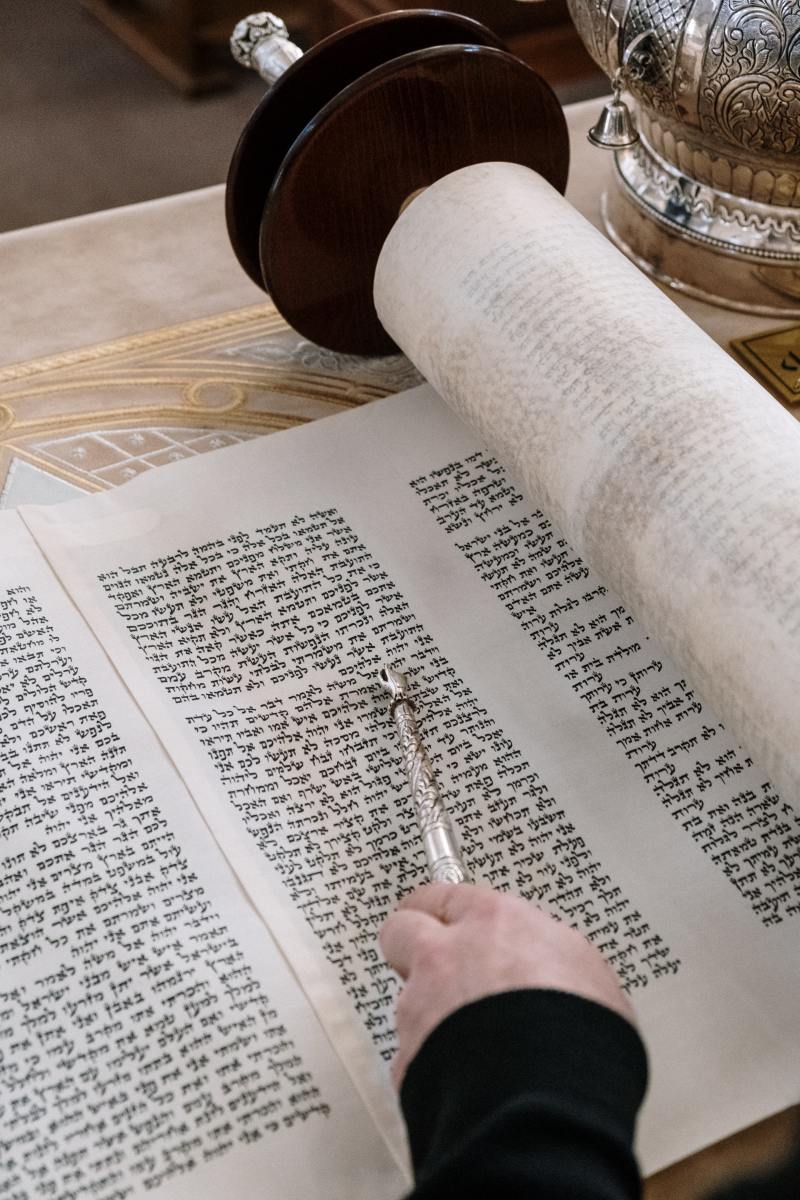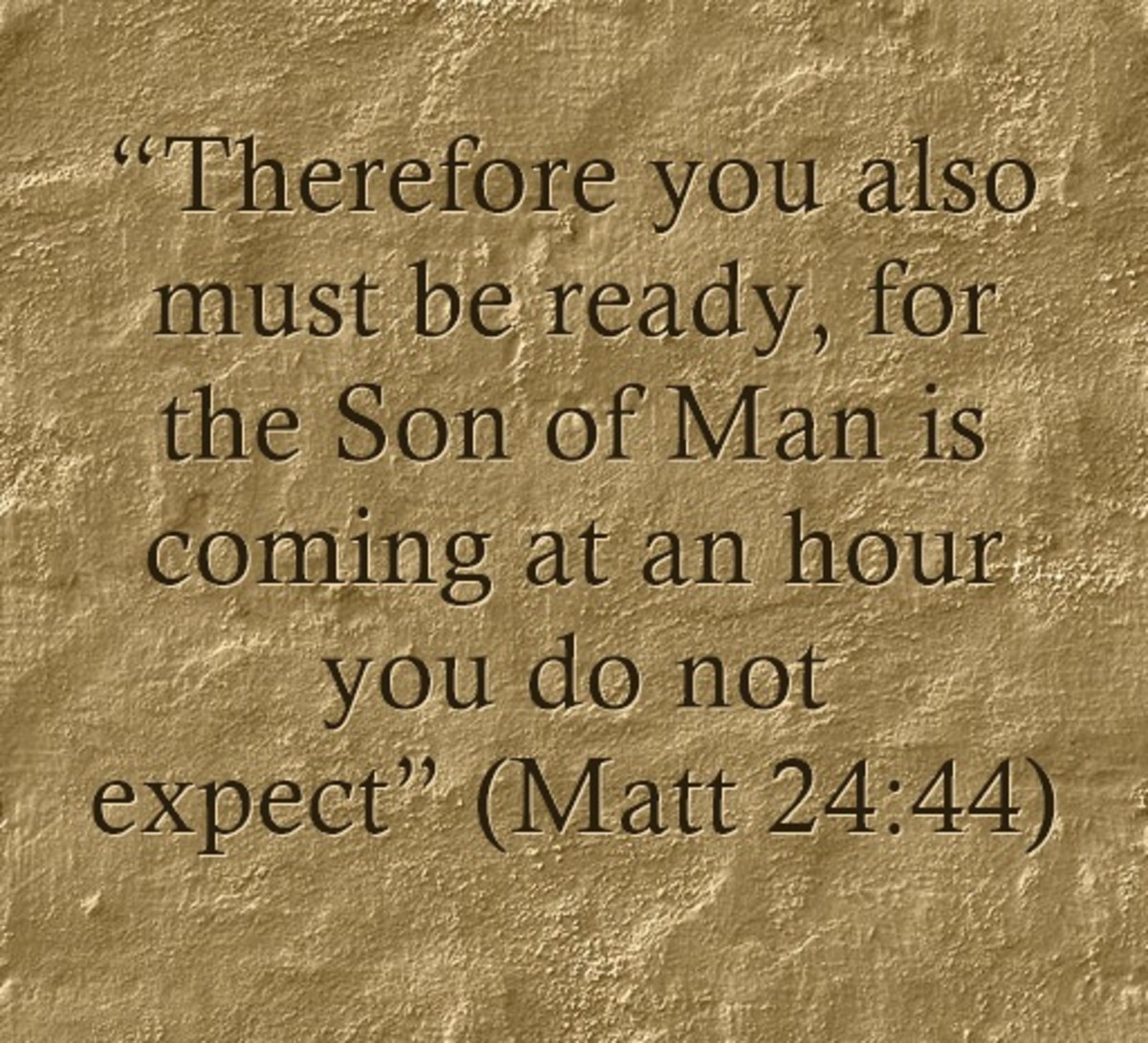Should We Keep the Dietary Laws?
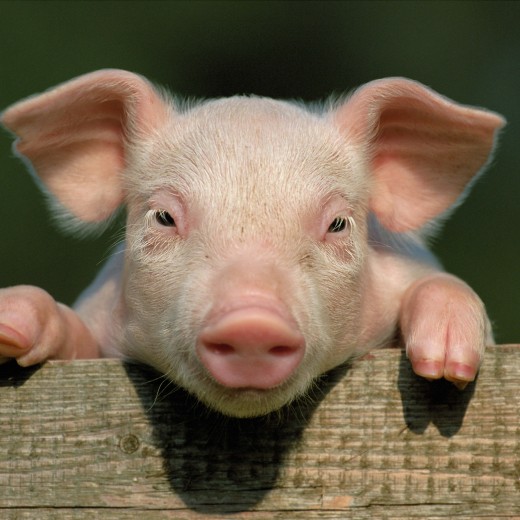
Before we get into the article don't forget to scroll down towards the very end to see a note on kosher foods and swine products.
Welcome. Today we are going to cover a very important topic: does the New Testament say that you can now eat the foods that are prohibited in the Old Testament? A lot of people are going to say yes, and they will most likely reference Paul's writings in order to prove their point. Let's take a closer look at the scriptures and find the answer.
With that being said, let's get into the scriptures.
- Matthew 6 25
- Matthew 15 11
- Mark 7 19
- Acts 10 15
- Romans 14 1-3 and 17
- 1 Corinthians 10 25
- Colossians 2 16
- 1 Timothy 4 4
- Hebrews 9 10 and 13 9
- Genesis 9 3-4
- The Purpose of the Dietary Laws: Teaching Obedience? Was It Because the Other Nations Used These Animals in Their Pagan Religions? or Health Reasons?
- Swine Products
- Affordable Clean Food and How to Tell If Something Is Kosher
Matthew 6 25
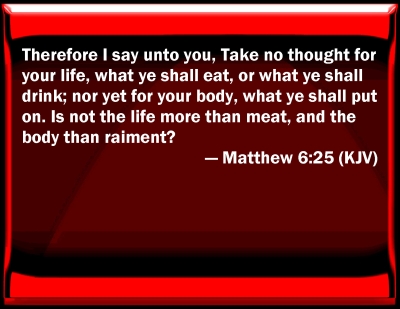
24 No man can serve two masters: for either he will hate the one, and love the other; or else he will hold to the one, and despise the other. Ye cannot serve God and mammon.
25 Therefore I say unto you, Take no thought for your life, what ye shall eat, or what ye shall drink; nor yet for your body, what ye shall put on. Is not the life more than meat, and the body than raiment?
— Matthew 6:24-3326 Behold the fowls of the air: for they sow not, neither do they reap, nor gather into barns; yet your heavenly Father feedeth them. Are ye not much better than they?
27 Which of you by taking thought can add one cubit unto his stature?
28 And why take ye thought for raiment? Consider the lilies of the field, how they grow; they toil not, neither do they spin:
29 And yet I say unto you, That even Solomon in all his glory was not arrayed like one of these.
30 Wherefore, if God so clothe the grass of the field, which to day is, and to morrow is cast into the oven, shall he not much more clothe you, O ye of little faith?
31 Therefore take no thought, saying, What shall we eat? or, What shall we drink? or, Wherewithal shall we be clothed?
32 "(For after all these things do the Gentiles seek:) for your heavenly Father knoweth that ye have need of all these things."
33 But seek ye first the kingdom of God, and his righteousness; and all these things shall be added unto you.
So what he is saying is, "The Most High will provide for you. Do not be scared and think that you will not have what you need, including food. He has done all of this, so he'll do a lot more for you."
Matthew 15 11
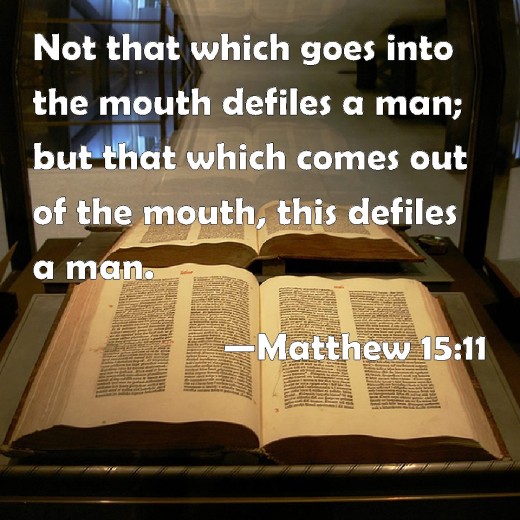
People like to say this verse is saying that whatever food you eat, it does not defile you. But this verse is not even talking about food. Turn to verse 1 and we will read to verse 20. Notice how the Pharisees are asking the Messiah why the disciples are transgressing the tradition of the ELDERS by not washing their hands before they eat. This was not a law in the Torah. How does he answer? He asks them why they transgress the commandment of the Almighty by enforcing their own tradition and not enforcing a scriptural law such as honoring your mother and father? That's part of the law. The ten commandments. In verses 7-9 he says Isaiah, in Isaiah 29 13, was right to prophesy about these people, that they honor God with their lips, but their hearts are far from him. They vainly worshiped him and had their own rules. Keep in mind that Isaiah was not prophesying about those specific men, but he was prophesying about Israel in his days, and it is right to compare that old prophecy and what these men here are doing now; acting as if they are righteously following God's law but in reality they are wickedly following their own. So what does make a man unclean? Verses 16 to 19 tells us. Evil thoughts of murders, adulteries, fornications, thefts, false witness, blasphemies. Sin makes you unclean. But what does verse 20 say? Eating with unwashed hands does NOT defile a man. This is not about food at all. But knowingly indulging in foods that are not good for you? That is another story, but we will go into that at the end of the article. If he was talking about unclean food or unwashed hands and unclean food, verse 20 would say he said neither this or unclean food defiles a man.
He wasn't against the Pharisees for preaching the law of eating clean meats. He was against them because they neglected the weightier matters, and they were being hypocrites who enforced their own traditions but always liked to point their finger at others. These were the same guys that Isaiah was talking about in Isaiah 29 13, talking about their love for the Most High with their mouths but their heart is not with him. They are hypocrites. That is why the Savior came. He came to preach the truth of the law to his lost people as they were being led astray by these prophets. There is also a reason as to why the Pharisees taught this doctrine which we will go into in Mark.
Mark 7 19
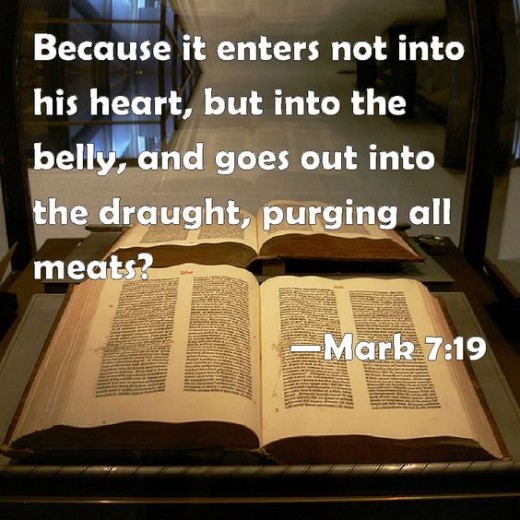
Cross reference this with the version in Mathew and we get a clearer understanding. Now, it says that when the meat goes through the belly and into the draught, it is purged. Now, what does this mean? Remember, the start of the argument was that the Pharisees were accusing the disciples of not washing their hands before they eat. This was not for hygienic reasons. They were not concerning themselves with getting germs in the context of this application of their tradition. The Pharisees believed that hands, bowls, plates, utensils, and even dining couches, could become “common” through ordinary use, and thus had to be washed (presumably because it could make a person “common” if he/she ate with them, cf. Acts 10 28). Although there are different reasons as to why they do this, this reason is one of them and was one of the doctrines that were prevalent in Biblical times, and this tradition has also carried into modern-day Judaism, but again, I say that not everyone who does this ritual is doing is solely for this purpose. There are different reasons as to why they do this. Self righteousness and ego was just one of the reasons the Pharisees did this. Below are some quotes from the Talmud, Sotah 4b.
A person who despises the washing of the hands before a meal is to be excommunicated.
— See Ber 47bWhoever eats bread without first washing his hands is as though he had sinned with a harlot.
— See Sotah 4bWhoever eats bread without scouring his hands is as though he eats unclean bread.
— See Sotah 4bHere's an example; Tom sits down on a bench. Brian says to himself, "If I sit down where Tom just sat, it will defile me and make me like everyone else." You can see that Brian is in error. (Did Jesus Declare All Foods Clean? A Hebraic Perspective on Mark 7:19 by Rob Roy).
The teachers of the law, in their zeal and superiority complex, made up this tradition and mandated it when they are not to add or remove from the Torah.
Now therefore hearken, O Israel, unto the statutes and unto the judgments, which I teach you, for to do them, that ye may live, and go in and possess the land which the LORD God of your fathers giveth you.
Ye shall not add unto the word which I command you, neither shall ye diminish ought from it, that ye may keep the commandments of the LORD your God which I command you.
— Deuteronomy 4 1-2Acts 10 15
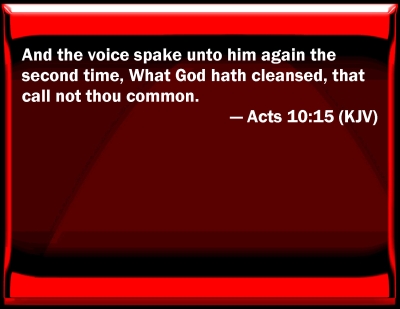
Read it until verse 14. But Peter said, “Not so, Lord, for I have never eaten anything that is common or unclean.” Why is he refusing? He was there when Christ supposedly said food did not defile us (which I disproved earlier in the article), so he should have had no problem in eating it. When you read all of Acts 10 you will notice the following.
- He did not eat it (14). Christ had already died and come back from the dead, and according to how most Christians interpret this his resurrection should have brought the end of the law but we still see Peter refusing the food.
- He wondered what the vision meant despite the fact that it seemed so simple (17).
- He relates this passage to meeting Cornelius, a man who was righteous but the Jews of that day still would have considered him unclean (28).
Read it until verse 28. This was symbolic of calling people unclean. It was not about eating unclean meat. Nowhere in this chapter does it say Peter did eat. The unclean animal is always unclean because that is its natural state and its function in the Earth. But a man is only made unclean by who he is, meaning righteous or not. And God can change any man's heart, no matter who he is.
Acts 15
Now we will debunk the idea that this chapter nullifies the dietary part of the law. Here is what is commanded of them in this chapter.
- Abstain from food sacrificed to idols
- Abstain from sexual immorality.
- Abstain from strangled animals (as all their blood is still in them) and from the blood.
Since there is no mention of eating unclean meats here, one might assume this had nothing to do with Torah. But take notice. 1 is based on the first and second commandments, and 2 is based on the 7th commandment. These things are based in the 10 commandments, part of the Torah. Where do we find that third order? Genesis 9 2-4, which says we must not eat meat that has its lifeblood still in it. This is also a law in the Torah. Leviticus 7 26.
Now we will get the proper context. There were Jews that were teaching these people that they would have no salvation unless they were first circumcised. When they brought this doctrine to the apostles and elders in Jerusalem, Peter called it "a yoke on the neck of the disciples which neither our fathers nor we were able to bear". Some Pharisees who believed rose up, saying, "It is necessary to circumcise them, and to command them to keep the law of Moses."
Peter states that all are "saved" through the grace of the Savior. As evidenced by this statement, the question they were discussing is whether or not these people were saved through the grace of Christ or by circumcision and keeping commandments. This was also the original question in Acts 15:1.
His point was that everyone is saved by grace, not by keeping the law or by circumcision. Even Jews who had been circumcised and kept the law didn't have salvation until they believed in the Savior. He also said that to make circumcision or Torah/law observance the requirement for salvation would be to "test God." But how would it "test God?"
So Peter, after detailing the proof that the Almighty had accepted these men in their uncircumcised state, affirmed that they are saved through the grace of the Savior rather than circumcision or any other act of Torah/law observance. The ultimate decision in Acts 15 by James was not to require circumcision for salvation. Circumcision of the flesh is nothing compared to that of the heart. Deuteronomy 10 16 and Romans 2 25-29.
Circumcise therefore the foreskin of your heart, and be no more stiffnecked.
— Deuteronomy 10 16ROMANS 2 25-29
- "For circumcision verily profiteth, if thou keep the law: but if thou be a breaker of the law, thy circumcision is made uncircumcision."
- "Therefore if the uncircumcision keep the righteousness of the law, shall not his uncircumcision be counted for circumcision?"
- "And shall not uncircumcision which is by nature, if it fulfill the law, judge thee, who by the letter and circumcision dost transgress the law?"
- "For he is not a Jew, which is one outwardly; neither is that circumcision, which is outward in the flesh:"
Circumcision is only an outward sign of being set apart to the Almighty. However, if the heart is sinful, then physical circumcision is of no avail. A circumcised body and a sinful heart are at odds with each other. Rather than focus on external rites, Paul focuses on the condition of the heart.
Galatians 6:12-13. These "false brethren" were actually Torah breakers themselves but they were most interested in circumcising these men so that they could boast about it. The focus on the praise of men was amongst the notable characteristics of some Pharisees of that time:
Please click here for a more in-depth study on the relationship between works and salvation (Note: I am not saying we are saved by works).
Romans 14 1-3 and 14-17
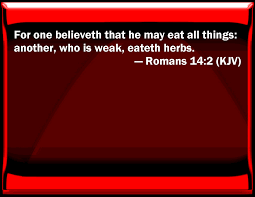
I recently got into a discussion with someone who said that when it says all things, it means you can eat all things including the unclean meats. But read verse 2 again. This is not about eating unclean meats. One person believes they can eat all things, and another eats "herbs". It is saying that if one person eats meat and another one does not, don't get onto them for it. When it says all things, it means eating all five food groups; dairy, fruit, grain, vegetables, and meat.
Verse 2 contrasts the person who "eats only vegetables" with the one who believes "he may eat all things"— meat as well as vegetables. Verse 6 discusses eating vs. not eating and is variously interpreted as referring to fasting (not eating or drinking), vegetarianism (consuming only vegetables) or eating or not eating meat sacrificed to idols.
Paul says that some days are esteemed by others and some are not. If we compare this with the food he mentions and how some "eat to the Lord" and some do not, we can conclude that these verses are referring to fasting. They were debating on which days they should fast. In Luke 18 12 we see a Pharisee fasting twice a week. Historical evidence proves that this was done on Mondays and Thursdays.
Luke 18:12. δὶς τ. σ., twice in the week: voluntary fasts on Mondays and Thursdays, ultra-legal in his zeal.—ἀποδεκατ-ῶ (-εύω, W. and H[141]) = δεκατεύω in Greek writers: tithing a typical instance of Pharisaic strictness.—πάντα, all, great and small, even garden herbs, again ultra-legal.—κτῶμαι, all I get (R.V[142]).
[141] Westcott and Hort.
[142] Revised Version.
— Expositor's Greek TestamentPaul was simply saying, "Fast whenever you feel led too, and since there is nothing wrong about setting aside certain days for doing so then no one is to judge you on it."
In verse 17 he says nothing is unclean in and of itself. As we will find out in 1 Corinthians the context here was about food offered to idols.
Learn more about Romans 14 here.
1 Corinthians 10 25
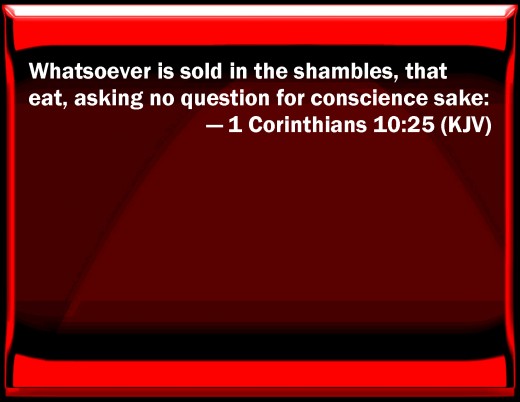
1 Corinthians 10 25. Unclean meats? We are going to read until verse 28. It says that if you find meat being sold in the shambles (that's a butcher's slaughterhouse), just buy it and eat it. Don't be asking questions on it if you know without a doubt that it is clean food. Verse 27 says something similar. "If any of them that believe not bid you to a feast, and ye be disposed to go; whatsoever is set before you, eat, asking no question for conscience sake." But if you go to verse 28 you will see that if anyone tells you that this food was offered to some false god, abstain from it if it is for your conscience's sake. So these verses are not about eating whatever you want. Here is what it is about; any clean food that is offered to you, don't worry about it and just eat it with no problem. Even if it was offered to a false idol, you are eating it without reverence to that idol.
The Corinthians here would have been surrounded by pagan culture, so it might be a stumbling block for someone to eat this food, especially if they are weak in their faith. The best course of action would be to not eat this around such a person and to not eat it yourself if you were such a person. And for those who say that the meat being sold would be unclean since the butcher and the seller were not keeping the Torah, that is almost right. That is assuming that there would never be a clean option available in the shambles. Though it would be less likely, it is not entirely possible that some of the food being sold would not contradict the Torah, such as beef without blood in it. You also have to take into account that these believers probably traveled to Israel and there were Jewish communities in Corinth so it is possible that they ate the meat from their shambles.
Colossians 2 16
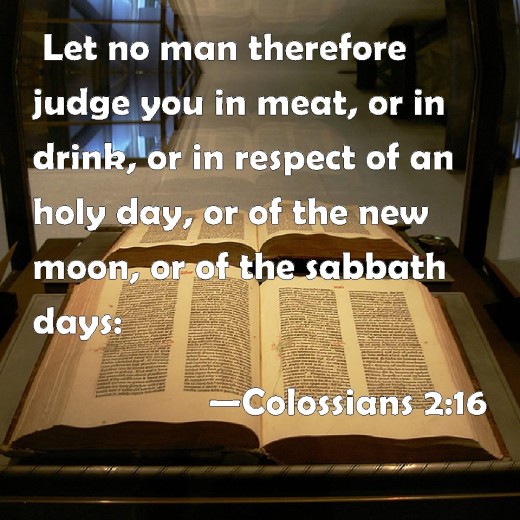
But what does this verse really mean? Paul is talking to believers that are keeping the Sabbath day and the new moons. He is saying to not let anyone judge us for keeping those days. Read it from verse 8 to 17 to get a clearer understanding and see how this is actually condoning the celebration of these days as a mandate. So obviously it is not about saying both the holy days or dietary laws can be thrown away. The believers in the Colossian community were being judged for enjoying the festival, as well as eating and drinking in it. Colossians 2 21 says they were told to not handle, taste, or touch. Colossians 2 18 gives an example of asceticism where they participated in self-abasement. They wanted to rob true believers of celebration by claiming that to be holy, you have to deny yourself during the high holy days and Sabbaths.
Paul was condemning the avoidance of anything enjoyable-which was intended to make its followers more spiritual. He says to the Colossians:
- 20 Wherefore if ye be dead with Christ from the rudiments of the world, why, as though living in the world, are ye subject to ordinances,
- 21 (Touch not; taste not; handle not;
- 22 which all are to perish with the using;) after the commandments and doctrines of men?
- 23 which things have indeed a shew of wisdom in will worship, and humility, and neglecting of the body; not in any honor to the satisfying of the flesh.
They had a false humility (verse 23) and were destined to fail because they were based on the "commandments and doctrines of men". Paul encourages the Church to hold fast to its teachings and proper understanding; it is not a treatise on which foods to eat or on which days to worship the Almighty. We must be careful not to read preconceived notions into these or any other scriptures."
This doctrine may have come from the Essenes, an ascetic sect of Second Temple Judaism that we will go into later (Essene, Ancient Jewish Sect by The Editors of Encyclopaedia Britannica). They forbade pleasure and they enforced celibacy.
1 Timothy 4 4
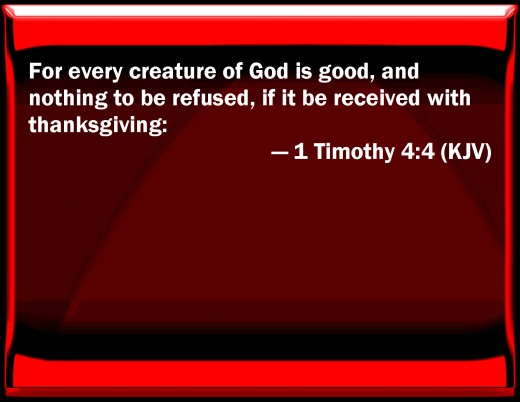
1 Timothy 4 4. Some will say, "See? It says that we are allowed to eat anything we want so long as we receive it with thanksgiving." See, you are not using the verse in context. Let's go to verse 1 in that same chapter. It says that later on, some shall depart from the faith, giving heed to seducing spirits, and doctrines of devils. It also says that they would be passing doctrines forbid you from marrying, and commanding to abstain from meats, which the Almighty created to be eaten with thanksgiving. For one, most who claim to follow the Torah and Messiah do not forbid marriage. I say most because I have not run into anyone who claims this although there might be people out there who do, I have seen some similar doctrines. And secondly, the prohibition of marriage may have come from the Essenes. They forbade pleasure and they enforced celibacy. The prohibition against eating meat was a common practice among Jews and possibly gentiles at that time. Still, this verse cannot be used to say it is in regards to the modern day Torah keepers since evidence shows otherwise.
Read it until verse 5. These meats are sanctified by the word of the Most High and prayer. So he created certain meats to be received with thanksgiving. Now, what is the significance of this verse?
1 Timothy 4:3, shows that the subject is persons insisting that people "abstain from meats, which he created to be received with thanksgiving of them which believe and know the truth."
What meats did he create to be received? the ones in Leviticus 11. Verses 4-5 are self-explanatory now. Verse 4 shows that "every creature" of him "is good and nothing is to be refused if it be received with thanksgiving." What does it mean by "every creature"? Verse 5 shows that it is those creatures sanctified or set apart by him, which are the same creatures of Leviticus 11
Hebrews 9 10 and 13 9
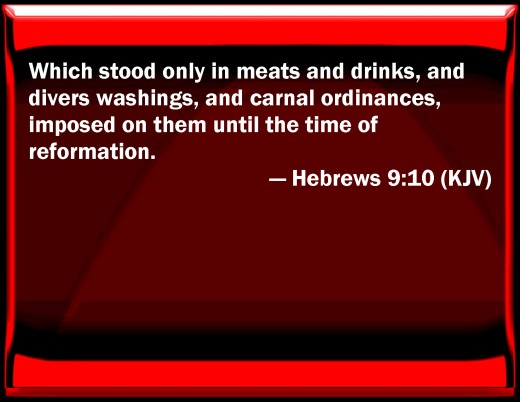
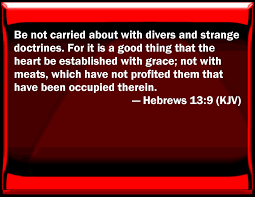
In Hebrews the limitations of the Levitical priesthood and sacrifices (9:1-7), is necessarily surpassed in effectiveness by the Messiah’s priesthood and final sacrifice and cleansing for all (9:11-28). The context shows that verse 10 was about the food they received in the priesthood. Throughout Leviticus we see that they ate the offerings. For example, the sin offering in 6 26. (Hebrews 9:8-10 – Were the Kosher Laws Only in Place “until a time of reformation”?)
As for Hebrews 13 9, some have associated this with food offered to idols or Jewish cultic meals. Hebrews 13:9-10 – Strange Teachings Associated With Foods
Now that we have gone over the New Testament arguments, we must ask ourselves one question; did the Most High God say that we could eat any animal we wanted to before the law was given to the 12 Tribes? Or was this law from the beginning?
Genesis 9 3-4
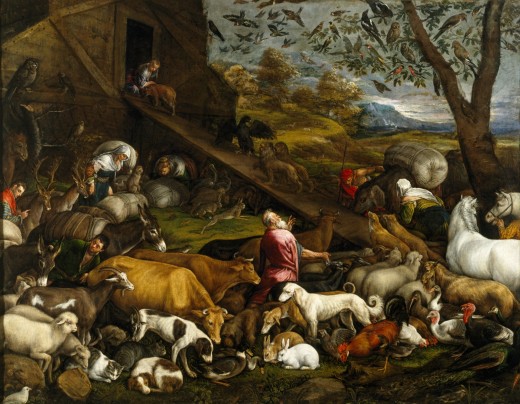
Every moving thing that liveth shall be meat for you; even as the green herb have I given you all things.
But flesh with the life thereof, which is the blood thereof, shall ye not eat.
There is the argument that before the 12 Tribes were given the law, there were no dietary laws for food such as pork, shellfish, etc. The common understanding of the previous verses is that every animal may be eaten, but if there is still blood in it, it must not be eaten. But we must go further into Genesis to understand this. For example, clean animals and unclean animals are given a clear distinction in Genesis 7 2-8 and 8 20. Why would these animals be called unclean? Because they were not meant to be eaten. What do we do with Genesis 9 3-4? To find the answer, we must go into the translation.
The noun (H473 Remes) and the associated verb (rmś) each occur seventeen times in the Old Testament, ten times each in Genesis 1-9. This word group is distinct from both the wild (predatory) beasts and domestic flocks and herbs. Neither verb nor noun is ever used to refer to larger animals or to domesticated animals. In no place is remes (H743) a catch-all category for all creatures.
— John H. Walton, The NIV Application Commentary: Genesis (Grand Rapids: Zondervan, 2001), pp 341-342.It is one category of creature only. The division of the Hebrew terms used up to this point in Genesis reflects the nature of the animal. These animals were typically characterized as being the prey of hunters and predatory beasts.
According to this, the “remes” animals would include the animals considered according to Leviticus 11 and Deuteronomy 14. Noah was not allowed to eat all the things. It was the exact opposite. It should state that every clean moving thing can be eaten. As we can see, this standard was applied to Noah and his sons, all of whom do not descend from the 12 Tribes since Abraham, Isaac, and Jacob would not be born for quite some time. To say that this only applies to them and that the Almighty did not hold the other nations up to this standard is incorrect.
(Every moving thing) which is wholesome and fit for food, and clean; an exception to be gathered both from the nature of the thing, and from the distinction of clean and unclean beasts, mentioned before and afterwards.
(That liveth). This is added to exclude the use of those creatures which either died of themselves, or were killed by wild beasts, which is here forbidden implicitly, and afterwards expressly. See Exodus 22:31 Leviticus 22:8.
— Matthew Poole's CommentaryIf the dietary law was given only to Israel, how come we see so many instances where they eat clean meats and no instance where they eat something unclean?
- Abraham gave a calf to his servant, and he killed it and offered it to his visitors (Gen. 18:5-8).
- Esau went out hunting venison and gave it to his father Isaac to eat. (Gen. 25:27-28). (Note: I know Esau himself did not follow the Most High or at least didn't later on, my point being that his righteous father ate clean venison and Esau seemed to have an understanding of this law).
- Jacob killed two goats and gave some of the meat to his father Isaac as an act of deception, to impersonate his brother Esau. (Gen. 27:9-25).
- Jacob claimed that he was not indebted to Laban because he had not eaten the rams of his flock. It was therefore customary to eat rams. (Gen. 31:38).
The Purpose of the Dietary Laws: Teaching Obedience? Was It Because the Other Nations Used These Animals in Their Pagan Religions? or Health Reasons?
I've heard many excuses to say why the Almighty gave these laws.
1. It was temporary to teach them obedience.
As we will see later on this is false.
2. Because the other nations used these animals in their religions, such as sacrificing them or revering them.
"This detail further insulated the Israelites from pagan practices. The Canaanites kept herds of swine and sacrificed them to idols. The connection between swine and pagan worship became so strong that the prophet Isaiah equated the sacrificial offering of pig’s blood with murder—both are called “abominations” (Isaiah 66:3)."
— Why did the Old Testament Law command against the eating of pork? by Got QuestionsBut there's a problem.
A donkey, as well as some sheep and goats whose remains were found in Early Bronze Age layers at Gath dating to 4900 years ago turn out to have been born and bred in the Nile valley.The discovery at the archaeological site of Tell el-Safi shows that animals were part of the extensive trading relations between the Old Kingdom of Egypt and Early Bronze Age Canaan (circa 2900-2500 BCE).
That there were trade connections between Egypt and Canaan in the Early Bronze Age is not new. The fact that animals were a part of the trade - and that they went from Egypt to Canaan - is very interesting,” Aren Maeir, head of the excavations in Gath, told Haaretz.
— Canaanites Imported Sacrificial Animals From Egypt, Archaeologists Find by Philippe BohstromNot all of the animals listed here are unclean. Those are the two main reasons that many people give. But according to scripture, this cannot be true. According to scripture, the calf is clean. What did the 12 Tribes worship when they came out of Egypt? Exodus 32 4 says they worshiped a golden calf, a cow. So now we must ask ourselves what the real purpose of these laws are.
What else does Got Questions have to say on the subject?
Then there are the hygienic concerns related to the Law’s dietary restrictions. It is well known today that pork carries any number of diseases, and the meat requires stricter cooking techniques than other meats such as beef or poultry. In Moses’ day, there was no knowledge of microscopic pathogens, and the cultural norm was to eat raw or under-cooked meat (Leviticus 19:26).
Of course, eating under-cooked pork would have posed a significant health threat to Israel, but God providentially protected them through the Mosaic Law. “If you pay attention to his commands and keep all his decrees, I will not bring on you any of the diseases I brought on the Egyptians, for I am the LORD, who heals you” (Exodus 15:26).
So according to them, one of these reasons may be because of health. Let's see what else they have to say.
A major part of the Bible’s health instruction dates back to the time of Moses. Yet in our day, many researchers and medical doctors are stunned at the accuracy and effectiveness of its many provisions. The Wycliffe Bible Encyclopedia tells us that the laws given by God to Moses contain remarkable rules pertaining to public health which concerns us even today: water and food contamination, sewage disposal, infectious diseases and health education.
— What does the Bible say about health? https://www.gotquestions.org/Bible-health.htmlObviously, God is more interested in our spiritual health than our physical well-being, but He does want us to be physically healthy as well. On the other hand, disease is a result of Adam’s sin, and even the most righteous may suffer. After all, Job was righteous, but God allowed him to suffer disease and hardship.
In one article they say the dietary laws may be for health reasons but even then they are done away with, yet in this article, they say God does care for our health. Let's see what scripture says. Leviticus 11 43-47 says the purpose of this law is to sanctify them. What does sanctify mean?
sanc·ti·fy
set apart as or declare holy; consecrate. "a small shrine was built to sanctify the site"
synonyms:consecrate, bless, make holy, hallow, make sacred, dedicate to God
"he came to sanctify the site"
make legitimate or binding by religious sanction."they see their love sanctified by the sacrament of marriage"
synonyms:approve, sanction, condone, vindicate, endorse, support, back, permit, allow, authorize, legitimize"we must not sanctify this outrage"
free from sin; purify.synonyms
Leviticus 11 44's use of sanctified.
Strong's Concordance
6942. qadash: <>
Original Word: קָדַשׁ Part of Speech: Verb
Transliteration: qadash
Phonetic Spelling: (kaw-dash')
Short Definition: consecrate
How It's Used
How is this used in scripture?
become consecrated (2), become defiled (1), become holy (1), consecrate (43), consecrated (35), consecrates (7), consecration (2), declare holy (1), dedicate (2), dedicated (8), dedicating (1), holier (1), holy (5), keep (1), keep it holy (2), keep the holy (3), made it holy (1), manifest my holiness (2), prepare (2), prove myself holy (2), proved himself holy (1), purified (1), regard as holy (1), sanctified (9), sanctifies (10), sanctify (12), etc
So he had these people become set apart/holy, unlike the other nations. But set apart how? We can agree that the Almighty is good, right? So his laws are good. He would not give them a bad law. What law did he set before them?
I call heaven and earth to record this day against you, that I have set before you life and death, blessing and cursing: therefore choose life, that both thou and thy seed may live.
— Deuteronomy 30 19So the laws he gave them were life. They were good. These laws are good. As shown, this same law was kept by Noah and his sons. These laws were meant to lead them to righteousness. How can an unrighteous or subjective law make you righteous by following it? To say that following these laws are for any other reason is not scriptural. The fact that he set apart these certain animals shows that there was a reason.
Now for anyone whose eyes are opened and would like to see which meats are good to eat and which are not, Leviticus 11 and Deuteronomy 14 is the place to go. It covers all of the kinds of meats you can eat, whether it is a land, sea, or air creature. When you're done with that click on the link below and you can see why the Most High gave this law on abstaining from pork. Leviticus 11 7-8.
- "And the swine, though he divide the hoof, and be clovenfooted, yet he cheweth not the cud; he is unclean to you."
- "Of their flesh shall ye not eat, and their carcase shall ye not touch; they are unclean to you."
Here is some more info on the Law.
Peace and blessings and all praises to the Most High.
Swine Products
- Swine Products
Almost everything has pork in it. Should you be concerned?
Affordable Clean Food and How to Tell If Something Is Kosher
One of the many complaints against eating a biblical diet is that it is not affordable. In many cases this is true, which is why I recommend the following websites.
I must also add that while things such as beef are expensive, the vast majority of clean products are not too expensive and can be found in any store. You'll recognize them by either a K, U (or OU), P, or a V (Not a C or R those are company copyright and registered trademark signs) marking somewhere on the package, also known as a hechsher. There may also be a Star of David (I am not affirming if it an idol or not right now), Hebrew letters, or the word kosher. Below is a list of the different signs you may see which signify if a food is clean according to the Torah. I must say that each kosher certification agency has its own rules and interpretations of scripture, so you must analyze whatever you're eating very carefully. So far the most reliable agencies I have come across are the Orthodox Union and the Star-K, who have done a lot of work to ensure kosher certification even in small details such as the packaging in our foods which sometimes contains unclean animals that can seep into our food.
The U means it was approved by the Orthodox Union, one of the largest kosher certification companies in the world. This means it can be eaten at any time unless the item contains leaven, which is prohibited on Passover.
The K just means kosher. This means it can be eaten at any time unless the item contains leaven, which is prohibited on Passover.
The P means it was prepared without meat or milk, which related to the traditional understanding of Exodus 23 19 of boiling a calf in its mother's milk (I do not affirm that this interpretation is true yet I am still doing the research). This means it can be eaten at any time unless the item contains leaven, which is prohibited on Passover.
There is also a Passover sign, which usually says Kosher for Passover, OKP, etc.
And finally, we have the V, which means vegan. While the Bible does not command us to be vegan, eating a vegan product eliminates any worries about eating something from an unclean animal. This is not certified by Jews, but vegans although there are items certified by both.
These symbols may also be used in combinations. For example, an OU-P means that the product is certified for Passover use (containing no leaven) and it is kosher all year round because some companies have kosher varients of products for this occasion.
For more information on the symbols, click here. For a longer list of certification organization symbols, click here.
